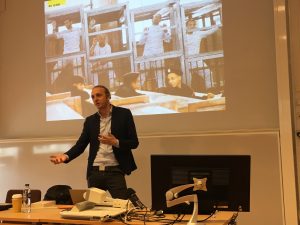
‘It is about collecting ideas and creating a movement for journalism’ – Martin Schibbye at JMG
When Swedish journalist Martin Schibbye was released in 2012 after 438 days in an Ethiopian jail, his fellow inmates begged: “Please tell the world what you have seen.”
Four years and a best selling book later, Schibbye is testing the market for in-depth foreign reporting with the Blank Spot Project, a crowd-funded start-up that is entering its second year.
When he returned to Stockholm, editors told him they didn’t have the budget they used to, there was a crisis in journalism and very little money to fund the reports that Schibbye wanted to do.
“What had happened while I was in jail, what happened to the business?” Schibbye told students on the Master’s in Investigative Journalism at Gothenburg University last week, after a flying visit while attending the Book Fair.
CLICK HERE to see video of the talk
On the other hand, as he travelled around Sweden he experienced a “huge interest” in the kind of journalism where you go to places where readers can’t go themselves, “where you use your feet and not just Google”.
“So it was not a crisis for journalism, it was a crisis of old business models of media companies with CEOs with salaries of tens of thousands of euros a month.”
So an idea started to grow – should he continue to try selling his stories to editors who couldn’t afford them? Or try something different?
Also, there was another development when it came to foreign reporting – a “hunting season” on journalists had been declared, Schibbye said.
‘It was not a crisis for journalism, it was a crisis of old business models’
“I and Johan [photographer Johan Persson] were among the first to be charged with terrorism, but after we saw it in country after country. We saw this in Egypt, Turkey, Iran – they used terrorism laws to criminalise journalists. The rules of the game had changed.”
So Schibbye concluded that foreign correspondents had to work in a smarter way, not parachute in and then leave, but use local journalists, work in teams, and think about security in new ways.
The third factor behind his thinking was “the cats”. “When we said we have an idea for a platform where people will pay for quality foreign journalism, people laughed! They said people want cute cats [on YouTube]! … So we thought: let’s launch a war against the cats.”
Within 18 months ago he had launched Blank Spot, raising over SEK 1m within three weeks, and winning more than 3,000 backers.
“It was amazing to see all the love. We inspired the industry by just launching the project, someone was doing something instead of just complaining, so many colleagues had given up on the profession,” Schibbye said.
Many supporters stepped up. Nurses at a big Stockholm hospital had a bake-off for journalism, selling bread and cakes to patients and doctors.
“But it was also about collecting ideas and creating a movement for journalism,” Schibbye said.
Supporters were not seen as just sources of money, as passive readers, but actively, with the journalists as discussion leaders, not just content creators. They created closed Facebook groups for each story they did.
So they did a story on mining in Peru, and the journalists had 500 followers with live updates on how the story was going.
‘We are entering golden years for journalism… You need to think larger than life!’
“They became ambassadors for the story, and afterwards they got a lot of tips. … This is one of the greatest untaped resources we have in journalism – the readers. We have to get out of the ivory tower and admit we know less than the readers.”
Blank Spot is trying to rethink the news, aiming to get to places before there is a story. Often with earthquakes the journalists go home just when the real struggle starts, maybe they return a year later. “We need to think of journalism as more pro-active.”
“It is all about testing and learning. Everyone is experimenting. And it is part of the joy of journalism to be experimenting with new ways go storytelling.”
Blank Spot is still a small project, with only two full-time employees. But its goal is 10,000 paying supporters. It is also covering stories at home in Sweden. The aim is to have correspondents who write on a particular them: a “peace corespondent”, for example, and a climate and food correspondents.
They are also working to get larger investors. Sven Hagströmer, a Swedish billionaire, has said he would give SEK 250,000 a year for the next 10 years. “There is a realisation that if you want to fight corruption you need to support journalism,” Schibbye said.
Schibbye is very optimistic about the future of journalism.
“We are entering golden years for journalism, as soon as this business model has been sorted out. Be inspired that people are prepared to pay for quality journalism, don’t be too depressed about the situation. You need to think larger than life.”
By David Crouch




